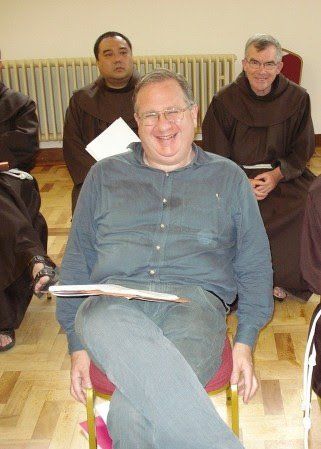Br Chris Dyczek Vocation Story
I was twenty six years old when I went to the novitiate in Chilworth, in 1979. But experiences of a relationship with Christ, as an active call to live out my faith as a creative path towards God, had existed through many of my childhood years. I loved poetry and drama. These often had no direct religious connections, yet they stirred up questions of life’s buried meaning. Seeing Macbeth as a live outdoor performance at the age of eight proved how fierce versions of supernatural fear (Banquo’s ghost) can destroy the loving reality of a meal and hospitality. The anger also made me aware that some who preached in Church were too keen to intimidate the congregation, ruining the meal symbolism of the Eucharist. In school, a repetitive set catechism answers was imposed as a matter of agreeing to fear, fear of being wrong. Love, the central message of Jesus, was being stifled, while events in Vietnam, and the shooting of Martin Luther King, emphasized the integrity needed for anyone to become a true child of God, living out the gospel message.
My breakthrough happened at age sixteen, because the topic set for GCE study was Acts of the Apostles and the letters of St. Paul. We suddenly met an awareness of faith as a compassionate journey, to set up caring communities in difficult circumstances. I identified very closely with St. Paul as a missionary, as a converting sinner, and as a man of ideas capable of defending and debating them. That same year I began reading philosophy, and asking more consciously what makes for life’s real purpose. In the Sixth Form, an enlightened RE teacher allowed us to read whatever book we might find in the library. From Copleston’s History of Philosophy, I learned about Augustine and Bonaventure: an illuminating Franciscan alternative to catechism routines. The Vatican Council spread awareness that faith should explore new points of view. In my home parish, several young families, and two religious sisters embraced the same freedom to discuss and to deepen their relationship with Christ and the Holy Spirit. I was also reading spiritual writings. By the time I was in university, my spiritual reading included contemporary theology, as well as the Fioretti of St. Francis. The need for peace-making communities around the world felt urgent, by the time I finished my degree: I spent a few weeks in a lay community.
I studied in Canterbury, just as the Franciscans were moving into the new UK Study Centre beside the university. Several student friars were involved in Chaplaincy events, easily turning into student friends, or as occasional visitors, giving profound talks and bringing vitality to the Chaplaincy retreat weekend. I was unsure, at the age of 21, what I could tackle as my path in the world, so I decided to test my convictions by joining a lay missionary organisation, the Volunteer Missionary Movement. I was placed as an English Literature and Language teacher in a school in Malawi, which had a transforming effect on me. The bonding energies of the Holy Spirit were a lived reality there. I felt I had let the Western world pull me into too many abstract worries, when what mattered most were lasting, caring relationships. It would take the experience of a fully Catholic Christian communal life to develop the best aspects of my character, I realised. This was how I reached the discovery, after three years in Africa, that God had been showing me my potential to have greater qualities of faith-sharing, commitment to hope, and sensitivity towards the vulnerable. These would only take root in me through the circumstances of fraternal trust in religious life, and in the Franciscan Order in particular. I was twenty-six when I returned to England to learn this new reality.
Since then I have been involved in a Youth Theatre project, sung with a Folk Group, organised vigils for Peace, helped a couple of refugees, and studied and taught a lively, contemporary version of spirituality and theology. The multi-cultural character of Franciscan living, both within community, and amongst those with whom we share our love of Christ, has frequently reminded me of the mission of the first gatherings of believers after Pentecost. Learning to appreciate God’s many-sided challenge to welcome and heal our neighbours far and wide has become my life’s core experience.

